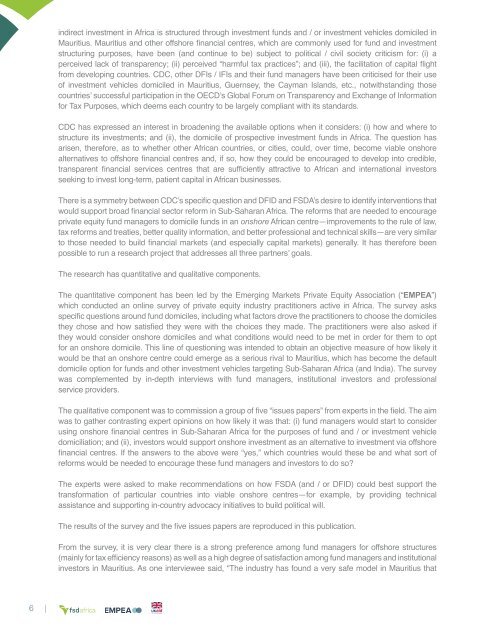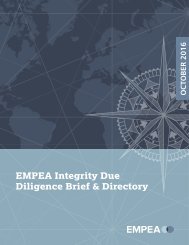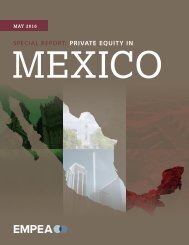You also want an ePaper? Increase the reach of your titles
YUMPU automatically turns print PDFs into web optimized ePapers that Google loves.
indirect investment in Africa is structured through investment funds and / or investment vehicles domiciled in<br />
Mauritius. Mauritius and other <strong>of</strong>fshore financial centres, which are commonly used for fund and investment<br />
structuring purposes, have been (and continue to be) subject to political / civil society criticism for: (i) a<br />
perceived lack <strong>of</strong> transparency; (ii) perceived “harmful tax practices”; and (iii), the facilitation <strong>of</strong> capital flight<br />
from developing countries. CDC, other DFIs / IFIs and their fund managers have been criticised for their use<br />
<strong>of</strong> investment vehicles domiciled in Mauritius, Guernsey, the Cayman Islands, etc., notwithstanding those<br />
countries’ successful participation in the OECD’s Global Forum on Transparency and Exchange <strong>of</strong> Information<br />
for Tax Purposes, which deems each country to be largely compliant with its standards.<br />
CDC has expressed an interest in broadening the available options when it considers: (i) how and where to<br />
structure its investments; and (ii), the domicile <strong>of</strong> prospective investment funds in Africa. The question has<br />
arisen, therefore, as to whether other African countries, or cities, could, over time, become viable onshore<br />
alternatives to <strong>of</strong>fshore financial centres and, if so, how they could be encouraged to develop into credible,<br />
transparent financial services centres that are sufficiently attractive to African and international investors<br />
seeking to invest long-term, patient capital in African businesses.<br />
There is a symmetry between CDC’s specific question and DFID and FSDA’s desire to identify interventions that<br />
would support broad financial sector reform in Sub-Saharan Africa. The reforms that are needed to encourage<br />
private equity fund managers to domicile funds in an onshore African centre—improvements to the rule <strong>of</strong> law,<br />
tax reforms and treaties, better quality information, and better pr<strong>of</strong>essional and technical skills—are very similar<br />
to those needed to build financial markets (and especially capital markets) generally. It has therefore been<br />
possible to run a research project that addresses all three partners’ goals.<br />
The research has quantitative and qualitative components.<br />
The quantitative component has been led by the Emerging Markets Private Equity Association (“EMPEA”)<br />
which conducted an online survey <strong>of</strong> private equity industry practitioners active in Africa. The survey asks<br />
specific questions around fund domiciles, including what factors drove the practitioners to choose the domiciles<br />
they chose and how satisfied they were with the choices they made. The practitioners were also asked if<br />
they would consider onshore domiciles and what conditions would need to be met in order for them to opt<br />
for an onshore domicile. This line <strong>of</strong> questioning was intended to obtain an objective measure <strong>of</strong> how likely it<br />
would be that an onshore centre could emerge as a serious rival to Mauritius, which has become the default<br />
domicile option for funds and other investment vehicles targeting Sub-Saharan Africa (and India). The survey<br />
was complemented by in-depth interviews with fund managers, institutional investors and pr<strong>of</strong>essional<br />
service providers.<br />
The qualitative component was to commission a group <strong>of</strong> five “issues papers” from experts in the field. The aim<br />
was to gather contrasting expert opinions on how likely it was that: (i) fund managers would start to consider<br />
using onshore financial centres in Sub-Saharan Africa for the purposes <strong>of</strong> fund and / or investment vehicle<br />
domiciliation; and (ii), investors would support onshore investment as an alternative to investment via <strong>of</strong>fshore<br />
financial centres. If the answers to the above were “yes,” which countries would these be and what sort <strong>of</strong><br />
reforms would be needed to encourage these fund managers and investors to do so?<br />
The experts were asked to make recommendations on how FSDA (and / or DFID) could best support the<br />
transformation <strong>of</strong> particular countries into viable onshore centres—for example, by providing technical<br />
assistance and supporting in-country advocacy initiatives to build political will.<br />
The results <strong>of</strong> the survey and the five issues papers are reproduced in this publication.<br />
From the survey, it is very clear there is a strong preference among fund managers for <strong>of</strong>fshore structures<br />
(mainly for tax efficiency reasons) as well as a high degree <strong>of</strong> satisfaction among fund managers and institutional<br />
investors in Mauritius. As one interviewee said, “The industry has found a very safe model in Mauritius that<br />
6 |





